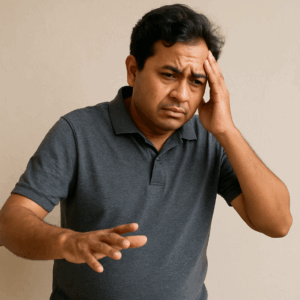🧠 OCD and the Body: Why Anxiety Can Feel Like Dizziness
 When we think of Obsessive–Compulsive Disorder (OCD), the common picture is of intrusive thoughts and repetitive behaviors — checking locks, washing hands, or arranging objects. But many patients with OCD also complain of physical symptoms that seem unrelated: dizziness, imbalance, headaches, stomach upset, or vague body pains. These symptoms can be just as distressing as the obsessions and compulsions themselves.
When we think of Obsessive–Compulsive Disorder (OCD), the common picture is of intrusive thoughts and repetitive behaviors — checking locks, washing hands, or arranging objects. But many patients with OCD also complain of physical symptoms that seem unrelated: dizziness, imbalance, headaches, stomach upset, or vague body pains. These symptoms can be just as distressing as the obsessions and compulsions themselves.
🤔 How Does OCD Affect the Body?
OCD is not only a disorder of thoughts and rituals — it also affects the body through:
-
Hypervigilance: The brain is constantly scanning for danger, making normal sensations feel exaggerated.
-
Muscle tension and fatigue: Ongoing anxiety leads to stiffness, pain, and imbalance.
-
Autonomic changes: Palpitations, sweating, dizziness, and lightheadedness may occur due to overactivation of the stress system.
-
Medication effects: Many people with OCD are on long-term medicines; side effects like drowsiness or imbalance can overlap with anxiety symptoms.
🌀 Dizziness and Imbalance in OCD
Patients often describe:
-
A sense of “floating” or “spinning” even when ENT and neurology reports are normal.
-
Feeling unsteady in crowded places, markets, or while walking in traffic.
-
Excessive focus on body sensations (“Why am I dizzy? Is something wrong with my brain?”).
This can become a vicious cycle: the more one worries, the worse the imbalance feels.
✅ What Can Help?
-
Optimised Medication
-
SSRIs (like fluvoxamine, fluoxetine, sertraline) are first-line for OCD.
-
Avoid unnecessary sedatives or overlapping drugs, as polypharmacy often worsens dizziness.
-
-
Cognitive–Behavioural Therapy (CBT) with Exposure–Response Prevention (ERP)
-
Teaches patients to face anxiety-provoking thoughts without ritualising.
-
Helps reduce attention to body sensations and breaks the fear cycle.
-
-
Mind–Body Techniques
-
Deep breathing, mindfulness, and yoga can stabilise autonomic symptoms.
-
Regular physical activity improves balance and reduces anxiety.
-
-
Vestibular Rehabilitation Exercises
-
For patients with chronic dizziness, simple maneuvers like Brandt–Daroff and Cawthorne–Cooksey can retrain the balance system.
-
-
Regular Follow-up
-
Track both psychological and physical symptoms.
-
Educate patients that the sensations are real, but not dangerous.
-
💡 Key Takeaway
OCD is not only in the mind — it can affect the entire body. Dizziness, imbalance, or vague physical complaints often reflect the way anxiety is processed in the brain. With the right combination of medication, therapy, and balance exercises, most patients experience significant relief.
👨⚕️ Consultation
I’m Dr. Srinivas Rajkumar T, Consultant Psychiatrist at Apollo Clinic, Velachery, Chennai.
If you or a loved one is experiencing OCD with troubling physical symptoms like dizziness or imbalance, you can consult me for a comprehensive treatment plan.
📞 Contact: +91 8595155808